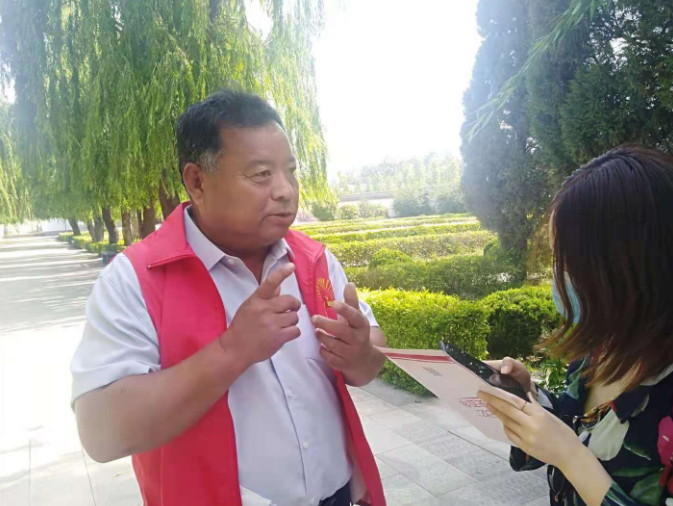Father and son volunteers safeguard martyrs' cemetery
- By Xu Xiaoxuan
 0 Comment(s)
0 Comment(s) Print
Print E-mail China.org.cn, June 2, 2021
E-mail China.org.cn, June 2, 2021

In the Liulisi cemetery of Gaotang county in Shandong province, lay 48 martyrs who sacrificed their lives in a battle in the county during the Chinese People's War of Resistance Against Japanese Aggression. Among them, only one martyr's name is known.
Every morning, local villager Zhang Yueping can be seen at the cemetery carefully weeding the yard and wiping down the tombstones. When visitors come, Zhang acts as a guide and introduces the heroic deeds of the martyrs to tourists clearly and comprehensively. He is not so much a professional as simply familiar with this time in history.
"I choose to be the cemetery keeper voluntarily and work here 365 days a year. The government gives me an allowance. However, I would still safeguard the departed heroes even if there was no subsidy," the more than 70-year-old Zhang said.
Zhang dedicated himself to taking care of the cemetery partially because he wanted to carry on the cause of his father, Zhang Hongzhu, the first keeper of the graveyard.
Born in 1932, Zhang Hongzhu enlisted as a soldier at the age of 16. After being demobilized in 1955, he got a job at a diesel engine enterprise in Shandong's capital city Ji'nan.
One time, when Zhang Hongzhu came back to visit his family in Gaotang county in Liaocheng city, he was surprised and dejected to see that the Liulisi cemetery was in a mess because of poor management. Sheep and other kinds of livestock raised by the villagers often grazed in it and trampled the graves. On top of that, the graves were becoming eroded by heavy rains due to the low-lying nature of the cemetery.
Zhang therefore decided to quit the job in the diesel engine company so he could instead watch over this sacred place, where the selfless fighters rest in peace.
Originally, Zhang lived in a small adobe house in the cemetery. Cemetery conditions improved in 1992 with the construction of a gate, walls, and a duty room from the support of the local government and residents.
Zhang Hongzhu protected the graves from the 1950s until his passing in 2012 — one year before the cemetery was rebuilt. At that time, his son Zhang Yueping took over as the new keeper of the graveyard.
"On his deathbed, my father told me to continue to take good care of the deceased heroes," recalled Zhang Yueping.
He hopes that the martyrs' stories can be known by more young people and their spirit can be passed on from generation to generation.






Go to Forum >>0 Comment(s)